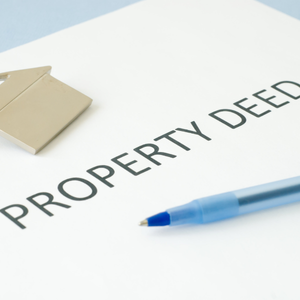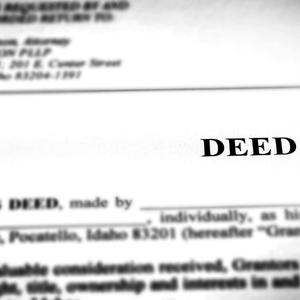
Selling your house in Irving, Texas, is already stressful enough without having to worry about missing paperwork—but yes, you do need the deed to sell. If you’re thinking “uh oh” because you have no idea where yours is, don’t panic. At Southern Hills Home Buyers, we’ve worked with plenty of Irving homeowners in the same situation. In fact, it’s common for people not to know where their deed is until it’s time to sell. Fortunately, Texas has processes in place to recover or verify ownership, so your sale doesn’t have to turn into a stressful event.
What is a Property Deed?
Your property deed is your house’s official ownership certificate. It’s got your name plastered all over it, plus a bunch of legal descriptions that spell out exactly which chunk of Irving dirt is yours. Dallas County keeps a copy on file, so there’s always a backup record of who owns what.
In Texas, and probably everywhere else, buyers get super paranoid about fake ownership claims, and honestly, they should be.
Your deed shuts down all that worry by proving you’re the real deal and can actually sell what you’re promising.
Types of Deeds Used in Irving, TX Home Sales
Irving has five different types of deeds, and they’re not all created equal. Some offer protection for your buyer, and others are basically “hope for the best” documents.
General Warranty Deed

The general warranty deed comes with every bell and whistle you could want. You’re telling your buyer the house is completely yours with zero hidden problems, and if anything weird pops up later, that’s on you to fix.
Most Irving sales use these because buyers actually sleep well at night knowing they’re covered.
Special Warranty Deed
You’re only covering problems that happened while you owned the place. Anything sketchy from before your time? Not your problem anymore.
Some buyers get a little jumpy about special warranty deeds, but it’s still good protection for most situations.
Grant Deed
These are kind of the middle child of deeds. You’re promising you haven’t sold the house to three other people behind everyone’s back, and you haven’t done anything totally crazy with the title.
But if something wild happened decades ago, your buyer’s on their own.
Quitclaim Deed
Quitclaim deeds dump whatever ownership rights might exist onto your buyer with zero promises about whether those rights are actually legit. Family transfers love these, but they make regular buyers break out in a cold sweat.
Bargain and Sale Deed
Red flags everywhere with these ones. They usually show up when something went seriously wrong… foreclosure, tax sale, that kind of drama. Your buyer will get the house as is with whatever baggage comes attached.
What Are Texas Legal Requirements for Selling Houses
As is with any state, Texas has some rules about how house sales work and they’re not kidding around. Your deed needs to get signed in front of a notary, then filed with Dallas County, or else your buyer just paid you for absolutely nothing legally binding.
We’ve seriously seen people try to skip the notary step to save twenty bucks and end up with legal issues that cost thousands.
Plus, you’ve got to handle property disclosures, transfer taxes, and make sure every single detail on your paperwork matches exactly.
If you get the street address wrong by one digit, you might accidentally sell someone else’s driveway. This sounds funny until it happens to you and lawyers start getting involved. To avoid costly mistakes and legal headaches, you can sell your home for cash in Irving or nearby cities and let professionals handle the details for a smooth, stress-free transaction.
Property Deed vs. Title: What’s the Difference
Your deed is that actual document sitting in your file cabinet right now. You can touch it, lose it, or accidentally use it as a coaster.
Meanwhile, your title is basically your legal claim to actually own the house, which exists whether you have the paperwork or not.
So you could theoretically own your house even if your dog ate your deed last Tuesday. But try explaining that to a buyer who wants proof before handing over two hundred grand.
The deed proves your title is real, and without both working together, your sale may be going nowhere.
Do I Need the Deed to Sell My House in Irving, TX?
So, do you need a deed to sell a house in Irving, TX? Yes, but you don’t necessarily need your original deed sitting right there in your hands.
A certified copy from Dallas County works just as well. In fact, most title companies prefer working with fresh copies anyway because the originals are usually crumpled up and coffee-stained from years of being shuffled around.
It should be certified, though. That random photocopy you made five years ago and stuck in a drawer isn’t valid.
You need the official stamp from the county clerk that says this copy is legit or your sale is going to stall out.
You can also get multiple certified copies, which means you can hand them out like candy to your realtor, title company, and lawyer without worrying about losing the one and only original, a helpful step when implementing strategies to prevent house foreclosure.
Essential Elements of a Valid Property Deed
Your deed needs five specific things to be legally bulletproof, and missing even one of them can jeopardize your entire sale. Here’s what has to be there or your buyer’s lawyer is going to have a field day tearing apart your transaction:
- Written document: No handshake deals or verbal promises that you pinky swore to your neighbor.
- Legally competent parties: Both you and the buyer need to be mentally sound adults who can make legal decisions.
- Property description: So specific that someone could find your house blindfolded in a snowstorm.
- Clear transfer language: Words that actually move ownership from you to the buyer.
- Proper signatures: Signed by you in front of a notary who’s not your best friend doing you a favor.
What Will Happen When You Can’t Locate Your Property Deed?
Don’t panic just yet. Losing your deed isn’t the end of the world, but it will definitely slow things down. Your sale can’t move forward until you prove ownership somehow, which means your closing date will just become a very optimistic suggestion rather than a firm deadline.
Buyers will start getting antsy, and real estate agents will start making worried phone calls. Everyone involved will begin wondering if this deal is actually going to happen.
But as we’ve shared earlier, Dallas County has records of every deed filed since the dawn of time, so your ownership information is sitting safely in their system.
You’ll need to go through a few processes, but it’s totally doable. Just plan on adding a few extra weeks to your timeline and maybe bribing your realtor with coffee for their patience.
How to Sell a House in Irving Without a Deed

Alright, so your deed has vanished into thin air, maybe it’s buried in a moving box or your ex took it out of spite. Whatever happened, you don’t need to involve hiring a private detective or tearing your house apart board by board.
Here’s your step-by-step guide to get back on track and actually close this sale:
Step 1: Contact the Dallas County Clerk’s Office for Property Records
Go to the Dallas County Clerk’s office or visit their website and start looking through their property records. They’ve got every deed filed since Texas was still figuring out what it wanted to be when it grew up.
You’ll need your property address and maybe your name from when you bought the place, so you can pull up your ownership fast.
Step 2: Obtain a Certified Copy of Your Deed
Once you’ve located your deed in their system, pay over about fifteen bucks and get yourself a shiny new certified copy. This copy comes with all the official stamps and seals that make title companies happy.
It’s also probably in better shape than whatever wrinkled mess you had stuffed in a file cabinet anyway.
Step 3: File an Affidavit of Lost Deed if Necessary
Sometimes the county clerk’s office wants you to swear under oath that you actually lost your deed and aren’t trying to pull some sketchy double-sale scheme.
Fill out their affidavit, get it notarized, and file it with the county. This is to prove you’re not a criminal, simply disorganized.
Step 4: Work with a Title Company to Clear Title Issues
Your title company is about to become your lifeline because they’ll dig through decades of property records to make sure nobody else has any claims on your house.
They’ll also spot any weird liens or legal problems that could blow up your sale later. So let them do their work while you stress-eat snacks.
Step 5: Consider Quiet Title Action for Complex Cases
If your property has some seriously messy history (like multiple owners, boundary disputes, or liens from the Carter administration), you might need to file a quiet title action.
This is basically asking a judge to officially declare that you’re the real owner and everyone else can buzz off. However, it takes months and costs real money.
Step 6: Explore Alternative Documentation Options
Sometimes you can piece together ownership proof using old mortgage documents, property tax records, or insurance policies that show you’ve been treating the place like it’s yours.
It’s not as clean as having a deed, but desperate times call for creative paperwork solutions.
How Much Does Fixing Deed Problems Actually Cost?
Now, the money talk because that’s probably what’s keeping you up at night right now. Deed problems range from super cheap fixes to those that can seriously hurt your wallet. Most people assume fixing deed issues costs thousands, but a lot of problems can get solved for less than your monthly car payment.
Here’s the breakdown of what you’re actually looking at cost-wise, so you can stop imagining worst-case scenarios in your head:
| Problem Type | Cost Range | Timeline | Worth It? |
| Certified Copy of Deed | $10 to $25 | 1 to 2 weeks | Yes – cheapest fix ever |
| Affidavit of Lost Deed | $50 to $150 | 2 to 3 weeks | Yes – covers your legal bases |
| Title Search & Insurance | $300 to $800 | 3 to 4 weeks | Must-have protection for buyers |
| Real Estate Attorney Consultation | $200 to $500/hour | Varies | Worth it for complex cases |
| Quiet Title Action | $1,500 to $5,000+ | 6 to 12 months | Only if absolutely necessary |
| Property Survey | $400 to $1,200 | 2 to 4 weeks | Essential for boundary disputes |
| Lien Release Processing | $100 to $500 | 1 to 3 weeks | Cheaper than losing your sale |
You should start with the cheap stuff: get that certified copy, file any needed affidavits, and see if that solves your problem before you start throwing serious money at lawyers.
Most deed issues in Irving get fixed with low-cost solutions. You only need the expensive options when your situation has gone completely sideways with multiple owners, ancient liens, or boundary disputes that nobody can figure out.
Is the Property Deed Needed for Selling a House in Irving, TX: Special Circumstances
Sometimes your house sale will get extra complicated because that’s just how life is. There are certain situations that will make your regular deed requirements a lot harder.
Here’s how to handle the messy stuff that makes real estate agents sweat:
Foreclosure and Distressed Property Sales
Foreclosure sales follow different rules, different paperwork, and way more stress for everyone involved. If you’re selling a foreclosed property, you’re probably dealing with a deed that came from a sheriff’s sale or trustee sale, which means it has about as much warranty protection as a chocolate teapot.
Buyers know they’re taking a huge risk, but they also know they might be getting a killer deal.
Estate Sales and Probate Situations
Selling a house after someone dies can cause a lot of paperwork stress that makes regular sales look like kindergarten coloring books.
You’ll need death certificates, probate court orders, executor deeds, and probably a therapist by the time you’re done with all the legal hoops.
The deed situation will get even messier if the deceased person never updated their will or if family members start fighting over who actually owns what. This happens way more often than anyone wants to admit.
Divorce and Joint Ownership Transfers
Divorce sales are emotional roller coasters, and the deed issues can get crazy. When both spouses are on the original deed, you need both signatures to sell, even if one of them would rather set the house on fire than cooperate with the sale.
Sometimes you’ll need a quitclaim deed to remove one spouse from the title before you can sell. Sometimes the divorce decree will handle the transfer automatically, but good luck figuring out which situation applies without a lawyer.
Can Cash Buyers Handle Deed Complications?
Cash buyers can save you when your deed situation has gone completely sideways. These buyers purchase houses for a living, which means they’ve seen every possible paperwork disaster and know exactly how to fix problems that would send regular buyers running for the hills.
They’ve got lawyers on speed dial and title companies they trust. They also have enough experience to spot solutions that nobody else would even think of.
Cash buyers also don’t deal with some cranky mortgage underwriter who freaks out over every tiny imperfection in your paperwork. They can close in two weeks instead of two months, and they’re usually willing to handle the deed replacement process themselves if it means getting the deal done.
So if your deed situation is keeping you up at night, calling a cash buyer might just save your sanity and your sale.
Frequently Asked Questions
Can I sell my house in Irving without the original deed?

Yes! Your original deed is nice to have, but a certified copy from Dallas County works just as well. Most title companies actually prefer the certified copies anyway because they’re clean and come with all the right stamps that make everyone happy.
How much does it cost to get a replacement deed in Irving?
Dallas County charges about fifteen bucks for a certified copy of your deed, which is the best money you’ll spend during your entire sale process. This is way cheaper than hiring a private investigator to track down your missing paperwork or paying a lawyer to fix problems later.
What happens if someone else claims they own my house?
This is exactly why title insurance exists and why title companies do all that work before your closing. If someone pops up claiming they own your house, your title insurance will handle the legal mess and protect your sale. It’s scary to think about, but super rare in real life.
Can I sell my Irving house if there’s a lien on the property?
Sure, but the lien has to get paid off before the sale can close. Most of the time, this will get handled automatically at closing using your sale proceeds. The title company just cuts a check to whoever you owe money to and gives you whatever’s left over.
How long does it take to replace a lost deed in Irving?
Getting a certified copy from Dallas County usually takes about a week if you do it in person or maybe two weeks if you mail in your request. If you need to file additional paperwork like an affidavit of lost deed, add another week or two to be safe.
Do cash buyers really buy houses with deed problems?
Yes! Cash buyers deal with complicated deed situations all the time because that’s literally their business. They’ve got the experience and the legal team. Plus, they have the patience to handle paperwork that would send regular buyers to the exit door.
Key Takeaways: Do You Need a Deed to Sell A House in Irving, TX?
Let’s wrap this whole deed situation up with the stuff you actually need to remember when you’re trying to sell your Irving house. Yes, you need a deed to sell your house in Texas, but losing yours isn’t the end of the world. Dallas County keeps records of everything, and getting a certified copy is way easier than you think. And if you’re looking for a faster, simpler option, you can sell your home for cash in Grand Prairie or nearby cities without the usual delays or paperwork headaches.
Wondering if you need a deed to sell a house in Irving, TX? The answer is yes—the deed proves ownership and is essential to complete a legal sale. If you’re missing the deed or unsure how to proceed, Southern Hills Home Buyers is here to help. We specialize in hassle-free home sales, offering fair cash offers and handling all the paperwork, including title and deed issues. Whether you want to sell quickly or avoid costly delays, we make the process seamless. Contact us at (214) 225-3042 for a no-obligation offer and get started today!
Helpful Irving Blog Articles
- Selling Your Duplex Quickly In Irving, TX
- Selling Your Fixer Upper House Quickly In Irving, TX
- Tax Implications of Selling Home in Irving, TX
- Do You Need a Deed to Sell a House in Irving, TX?
- Expert Guide To Downsizing Your Home In Irving, TX
- Does A Seller Pay Closing Costs in Irving, TX
- Can I Switch Real Estate Agents in Irving, TX
- Condemned House Requirements In Irving, TX
- Best Time To Sell A House In Irving, Texas
- Irving, Texas Property Tax Rate
- Irving, Texas Property Managers
- Irving, TX Neighborhood Map
- How To Sell Your Investment Property In Irving, TX
- Cost to Rewire a House in Irving TX
- Remove a Name From a Deed in Irving TX
- Cost to Repair Water Damaged Ceiling in Irving TX

| DOWNTOWN IRVING | REZONING | ZONING REGULATIONS | GRANTORS | REPLATS | PLATTED |
| PLATS | WARRANTIES | MAP | EMAILS | GENERAL WARRANTY DEED | SUBDIVISION |
| REAL PROPERTY | LICENSE | LICENSING | DEPARTMENT | PROPERTY VALUATION | VALUATION |
| CONCESSIONS | REALTORS | PAYMENT | LEGAL SERVICES | LAWYER | FLOOD |
| CONSTRUCTION | IRRIGATION SYSTEM | IRRIGATION | HOMEOWNER ASSOCIATION | HOMEOWNER ASSOCIATION (HOA) | DIVORCE |
| DIVORCING | COVENANTS | RESTRICTIVE COVENANTS | BACKGROUND CHECK | CRIMINAL BACKGROUND CHECK | TREE |
| MONEY | FORECLOSURE | FORECLOSE | DEED OF TRUST | VEHICLES | RIGHT-OF-WAY |
| PUBLIC RIGHT OF WAY | RIGHT OF WAY | REGULATIONS | LANGUAGE | FAX | FAXES |
| DEBT | PROBATE | PROBATE LAW | HEIRS | HEIRSHIP | HOME WARRANTY |
| DRIVER’S LICENSE | DEFINITION | JOINT TENANT | RIGHT OF SURVIVORSHIP | CHILDREN | AFFIDAVIT |
| SWIMMING POOLS | SIGNATURE | RECEIPTS | PRIVACY | MOBILE HOME | MINERAL RIGHTS |
| ALL RIGHTS RESERVED |
